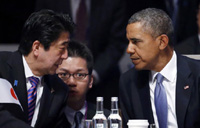TOKYO - The Japanese Cabinet on Tuesday approved new principles and guidelines on arms export, marking a major change on the war-renouncing country's defense stance for the first time in nearly half a century.
Under the newly adopted three principles on the transfer of defense equipment, Japan will prohibit the export of weapons to countries involved in conflicts and the principles would also apply when such exports violate UN. resolutions.
|
 |
With restrict screening, Japan will allow arms exports only if they serve the purpose of contributing to international cooperation and its security interests, according to the new rules.
The rules said that the unstated use and transfer of Japanese equipment to third parties will also be kept in check.
The original Japan's "three principles" on arms exports were adopted in 1967 and turned into a virtual blanket ban in 1976 and have been seen as a symbol of the country's pacifist stance.
The 1967 principles said Japan banned the transfer of weapons to communist states, countries subject to embargoes under UN resolutions and those involved in international conflicts.
Prime Minister Shinzo Abe, however, is eager to revise the country's defense and security policy and the new guidelines are one of his major policy goals.
The conservative leader is expected to decide whether to re-interpret the country's war-renouncing Constitution to enable Japan to exercise the right to collective self-defense.
Japan's Defense Minister Itsunori Onodera said after a Cabinet meeting in which the new rules were approved Tuesday that Japan will actively facilitate cooperation on defense equipment and technology with other countries, especially with the United States.
Analysts here said that Abe's move on the new arms export rules and attempt to exercise collective self-defense right will change the country's post-war pacifist road based on it war-renouncing constitution.
As relations between Japan and its neighbors are frayed due to territorial disputes, they added that Japan is seeking more military influence on the issues so as to show its tough stance, triggering vigilance from its neighbors on Japan's moves.
